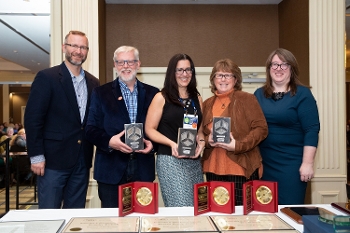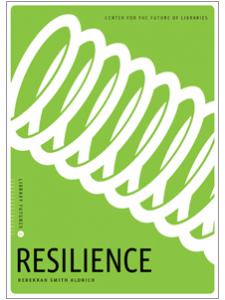
Three New York libraries have been certified as “Sustainable Libraries” through the award-winning Sustainable Library Certification Program, the first of its kind in the world, through the New York Library Association. The Hendrick Hudson Free Library, Saratoga Springs Public Library, and Lindenhurst Memorial Library were recognized at the 2019 Conference of the New York Library Association held in Saratoga Springs, NY, November 13-16, 2019.
“These three libraries have demonstrated leadership in conducting the operations of their organizations, as well as program and service design, with a critical eye towards environmental stewardship, economic feasibility and social equity, said Jeremy Johannesen, Executive Director of the New York Library Association, “Their efforts serve as a model for the 16,500 public libraries in the United States.
“The decision to undertake the certification process was an easy one for us. “It was a chance to help educate our community to the benefits of sustainable practices in all areas of our operations, to save a bit of money and more importantly the environment.”
Jill Davis, Director of the Hendrick Hudson Free Library
International Impact
The three libraries participated in the Sustainable Library Certification Program, the first program of its kind in the world to assist libraries of all types – public, academic, and school – to assess their opportunities to make better choices on behalf of the local and global community.
“The most important take away we’ve learned from this process is that it isn’t just important for libraries to consider – it is essential to the long term health and strength of the library within the community. Our patrons have reacted positively to the changes we made, in large part because they recognize that we are helping to create a more viable and sustainable community experience for everyone.”
Lisa Kropp, Director of the Lindenhurst Memorial Library
The program was recently recognized by the International Federation of Library Associations at their 2019 World Congress in Athens, Greece, becoming the first program from the United States to be recognized through their “Green Libraries” Award.
Comprehensive Approach
Each Library completed action items in twelve categories such as organizational commitment, waste management, energy consumption, land use, partnerships and social equity and resilience.
“Our Library has a more defined long-term outlook now regarding sustainability, and the important role we play in creating a more environmentally, fiscally, and socially just community for our patrons,” said Kropp, “We’ve become a leader within the community for sustainable practices, and our programs, partnerships, and environmental decisions reflect our dedication to the importance of this work.”
Fifty public libraries statewide are currently working on their certification and the school librarian and academic programs will launch in January of 2020.







